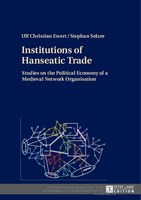Institutions of Hanseatic Trade
Studies on the Political Economy of a Medieval Network Organisation
Author(s)
Ewert, Ulf Christian
Selzer, Stephan
Collection
Knowledge Unlatched (KU)Number
101519Language
EnglishAbstract
The merchants of the medieval Hanse monopolised trade in the Baltic and North Sea areas. The authors describe the structure of their trade system in terms of network organisation and attempts to explain, on the grounds of institutional economics, the coordination of the merchants’ commercial exchange by reputation, trust and culture. The institutional economics approach also allows for a comprehensive analysis of coordination problems arising between merchants, towns and the ‘Kontore’. Due to the simplicity and flexibility of network trade the Hansards could bridge the huge gap in economic development between the West and the East. In the changing economic conditions around 1500, however, exactly these characteristics proved to be a serious limit to further retain their trade monopoly.
Keywords
History; History; Bruges; Hanseatic League; LübeckDOI
10.3726/978-3-653-05851-2ISBN
9783653058512OCN
1076784368Publisher website
https://www.peterlang.com/Publication date and place
2016-11-30Classification
General and world history


 Download
Download